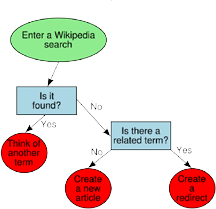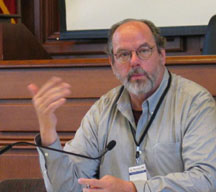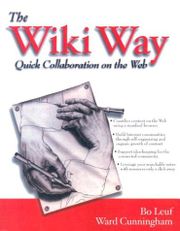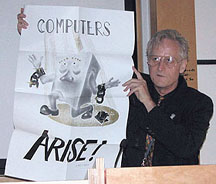
Logo for Wikipedia, the free online encyclopedia
| This is a work in progress: lots of writing, formatting, revising, proofing left to do! — David McMurrey |

One sentence-style problem that creates wordiness and brain-twisting perplexity for readers involves negative phrasing. Here, this kind of negative phrasing does not mean double negatives:
Class double negative: He don't know nothing.
Nor does it refer to a negative attitude:
Expression of negative attitude: She is such a gloomy, negative type!
Rather, the kind of negative phrasing you focus on here is grammatically correct—it's just wordy and perplexing. Negative phrasing is often used for rhetorical effect, namely emphasis:
Rhetorically effective negative phrasing: The school's motto is "Not without honor."
The positive phrasing With honor falls flat, lacks drama and emphasis. Nothing wrong with this sort of negative phrasing—although it is a bit stagey and possibly over-dramatic.
Negative phrasing can be awkward, wordy, and confusing as in this example:
Confusing, wordy negative phrasing: Public-school education cannot be improved if tax increases specifically for education are not introduced.
This example is not officially a double negative because the negative elements occur in different clauses within the sentence. The specific negative phrases are cannot be improved and are not introduced. How much easier to grasp the meaning of this sentence if it is expressed in the positive:
Revision with positive phrasing: Public-school education can be improved if tax increases specifically for education are introduced.
Here's another example:
Confusing, wordy negative phrasing: Hyphenate the adjective and the modifier that looks like a noun if not doing so might create reader confusion.
Here, not doing so creates some mental perplexity, which readers will probably eventually overcome. But why perplex them at all—even momentarily—unless you are writing a mystery. How about this instead:
Revision with positive phrasing: Hyphenate the adjective and the modifier that looks like noun to prevent possible reader confusion.

This example did not have an obvious pair of negatives—only just the one negative phrase not doing so—but its negative phrasing was wordy and perplexing nonetheless.
Here is another variation:
Confusing, wordy negative phrasing: For developed countries, no alternative to the use of solar and wind power exists if they expect to stop being dependent on imported oil.
Here, the one obviously negative phrase is no alternative, but it may be a bit difficult to see the other negative phrases. However, it is hiding in the phrase stop being dependent. stop, and to some extent dependent, are both negatives in a subtle way. How about these revisions? (I know the one I prefer!)
Revision with positive phrasing:
For developed countries, no alternative to the use of solar and wind power exists if they expect to become independent of imported oil.
Developed countries must use solar and wind power exists if they expect to become independent of imported oil.
As you can see, awkward, wordy, perplexing negative phrasing occurs in at least three forms:
Watch for these types in the practice examples that follow.
With that introduction to the negative-phrasing problem, consider the following examples. As you read, cover up the revisions, create your own revisions, and see how they compare.
Confusing, wordy negative phrasing: No agreement as to the assassination of John F. Kennedy will occur without definitive clarification that no "second shooter" was involved.
How negative can a sentence be? Not only are there two no's, but there is also a hidden negative, the word without.

Revision with positive phrasing: Full agreement as to the assassination of John F. Kennedy will occur once we have definitive clarification that no "second shooter" was involved.
Confusing, wordy negative phrasing: Change the color settings in the software application if not doing so might cause color distortion in the printouts.
So when should I change those settings?
Revision with positive phrasing: Change the color settings in the software application to prevent color distortion in the printouts.
Confusing, wordy negative phrasing: For cities with high volumes of automobile traffic, no relief will ever be possible unless they put a halt to single-occupant vehicles.
The meaning of the original here is not so dificult to comprehend. But notice how the positive phrasing takes so many fewer words.
Revision with positive phrasing: Cities with high volumes of automobile traffic must discourage single-occupant vehicles.
Confusing, wordy negative phrasing: Aristotle realized that the Earth’s shadow on the moon was never anything but round, which could not be true if the Earth was spherical.
When is that shadow round? Why is it round? Help!
Revision with positive phrasing: Aristotle realized that the Earth's shadow on the moon was always round, which could only be true if the Earth was spherical.
Confusing, wordy negative phrasing: The Greeks thought that the Earth could not be flat because one does not see the entire ship all at once on the horizon, but instead the sails of the ship first and then only later the hull.
How can people think like this? Something is not because something else is not.
Revision with positive phrasing: The Greeks thought that the Earth could not be flat because one sees the sails of the ship first and then only later the hull.
Confusing, wordy negative phrasing: Newton never said that the idea of gravity did not come to him when he was hit on the head by the fall of an apple.

Well, maybe the original sentence is accurate although there may be a less brain-twisting way to state it as the second revision suggests.
Revision with positive phrasing:
Newton never said that the idea of gravity came to him when he was hit on the head by the fall of an apple.
or
Newton never disavowed that the idea of gravity came to him when he was hit on the head by the fall of an apple.
Confusing, wordy negative phrasing: Because the fixed stars did not appear to change their relative positions as the Earth went around the sun, it was not unnatural for Newton to suppose that the fixed stars were objects like our sun but much farther away.
Having two negative phrases in a sentence is just about always a problem. Change to positive and things get better. The following changes both. Even so, the phrase not unnatural is commonplace—it is one of those rhetorically effective negative phrases. Almost always, however, positive phrasing is less wordy than negative phrasing—even if less dramatic.
Revision with positive phrasing: Because the fixed stars maintained their relative positions as the Earth went around the sun, Newton theorized that the fixed stars were objects like our sun but much farther away.
Confusing, wordy negative phrasing: Even those who realized that Newton’s theory of gravity showed that the universe could not be static did not think to suggest that it might be expanding.
I dare you to find a less-negative revision of this one. I can't. Sometimes you just cannot get around this grammatically legal form of double-negative writing.
Revision with positive phrasing: Even those who realized that Newton's theory of gravity showed that the universe could not be static did not think to suggest that it might be expanding.
Confusing, wordy negative phrasing: The early Jewish, Christian, and Muslim cosmologies could not avoid postulating an explanation of the beginning of the universe because they felt that the existence of the universe could not explained without having a first cause.
When you cannot avoid something, you . . . .
Revision with positive phrasing: The early Jewish, Christian, and Muslim cosmologies sought an explanation of the beginning of the universe because they felt that the existence of the universe could only be explained by a first cause.
Confusing, wordy negative phrasing: Aristotle and most of the other Greek philosophers, on the other hand, did not like the idea of a creation because they did not like the idea of divine intervention.

They did not like this; therefore, they did not like that. Not much you can do with this one (or at least I can't) other than convert the directly negative did not like to the hidden negative rejected (which is two less words).
Revision with positive phrasing: Aristotle and most of the other Greek philosophers, on the other hand, rejected the idea of a creation because they did not like the idea of divine intervention.
Confusing, wordy negative phrasing:
In 1929,Edwin Hubble made the landmark observation that you can not look anywhere amongst the stars and not see that stars are moving rapidly away from us.
The original negatively phrased version may not seem particularly bad. Remember that there is never any right-wrong when it comes to the sentence-style problems. Let's put it to a vote.
Revision with positive phrasing: In 1929,Edwin Hubble made the landmark observation that when you look anywhere amongst the stars you only see stars moving rapidly away from us.
Confusing, wordy negative phrasing: It was not until 1924 that the American astronomer Edwin Hubble demonstrated that ours was not the only galaxy.
Classic example of two negative phrases in separate clauses of a single sentence. The sentence is short enough that the negative phrasing is not particularly wordy or perplexing.
Revision with positive phrasing: In 1924, the American astronomer Edwin Hubble demonstrated that ours was not the only galaxy.
Get the idea? If you are confident with what you've studied in this chapter, use this exercise to test yourself:
Throughout this book, you've been challenged to imitate the sentence-style problems you have studied and revised. The notion is something like this: if you know your enemies, you can defeat them. Creating awkward, wordy, perplexing negatives is one of the hardest things of this nature you'll do in this book. It takes a certain mindset—perhaps a perverse one—to imagine a bewilderingly negative version of a perfect decent positively phrased sentence.
Now—alone and unafraid—try your hand at converting perfectly decent positively phrased sentences to awkward, wordy, perplexing negatively phrased sentences:
Original version: One of the fastest ways to understand wikis is to see how wikis are different from many other tools for Internet-based communication such as e-mail, blogs, bulletin boards, forums, content management systems, and Web publishing systems.
Come on. Just be negative! You can rephrase this self-respecting sentence with three not's.
Negatively phrased version: Not to understand wikis is to not to see how wikis are not similar to many other tools for Internet-based communication such as e-mail, blogs, bulletin boards, forums, content management systems, and Web publishing systems.

Original version: Content management systems can only be used by expert programmers, whereas wikis can be used even by those lacking programming skills.
More not's please.
Negatively phrased version: Content management systems cannot be used by anyone except for expert programmers, whereas wikis do not exclude those lacking programming skills.
Original version: The growth of wikis was severely limited up until 2006 because the only way you could use a wiki was to first set up a wiki engine on a server.
Once again, the not's have it.
Negatively phrased version: Wikis could not grow until 2006 because you could not use a wiki if you did not know how to set up a wiki engine on a server.
Original version: Most of us are nervous about putting incomplete work in a public place. For wikis to work, though, this has to happen.
It's so easy being negative—especially with the wonderful not.
Negatively phrased version: Most of us are not comfortable about putting work that is not complete in a public place such as the Web. Wikis cannot work unless this is not disallowed to happen.
Original version: One of the reasons why ideas can flow so quickly when creating content in a wiki is that links to wiki pages can serve as placeholders for later thinking.
Yes, it's a three-letter word . . .
Negatively phrased version: One of the reasons why ideas do not stagnate when creating content in a wiki is that links to wiki pages are not closed to later thinking, but serve as placeholders for later thinking.
Original version: In wikis, the idea of one author is shattered. Because of this, unfinished content ends up being encouraged because it provides the opportunity for other authors to come in and help finish the job.
At last, some variation: what is the opposite of encourage? what is a one-word opposite of provides the opportunity?
Negatively phrased version: In wikis, there is no such thing as one author. Because of this, content that is not finished is not discouraged because it does not suppress the opportunity for other authors to come in and help finish the job.

Links to these exercises are provided at the end of the preceding sections where they are relevant. But here they all are in case you read the text straight through:
Return to the table of contents
Information and programs provided by admin@mcmassociates.io.